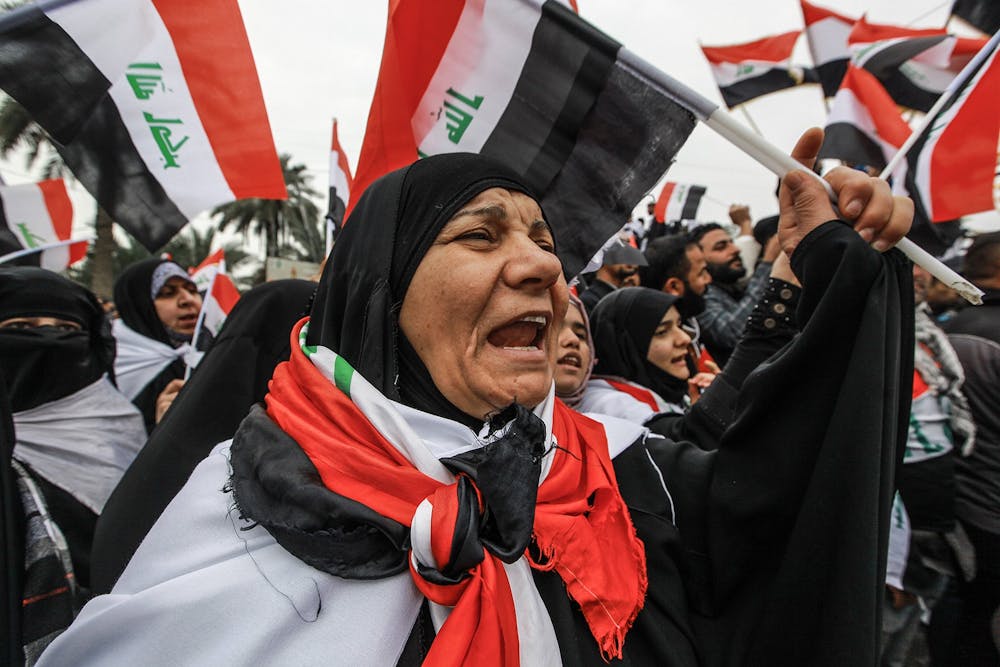On Jan. 24, Iraqi citizens participated in a massive march against the continued U.S. occupation of their country. One estimate from the Iraqi Center of Studies put the number of demonstrators at 2.5 million.
Marchers held signs that read “America, the Devil; You have no mercy” and “No America.” The main stage of the event had a large banner that read “Get Out America.”
Instead of displaying imperial arrogance, the U.S. should listen to Iraqis and leave their country.
After Trump’s illegal assassination of Iranian General Qasem Soleimani on Iraqi soil Jan. 3, an outraged Iraqi parliament voted in favor of expelling the nearly 5,000 U.S. forces from the country Jan. 5. The Trump administration scoffed at the idea and pledged to add another 3,000 soldiers to the Middle East.
Though the immediate spark for the protests was the killing of Soleimani, the roots for the justified Iraqi anger at the U.S. go far deeper.
The important thing to understand is that our country functions a lot like a mafia boss. If a country is useful to us, even if they commit atrocities, we tolerate them. If they disobey orders, they are met with violence. Iraq is illustrative of this point.
In the 1980s, brutal Iraqi dictator Saddam Hussein was a U.S. favorite. In order to confront the rise of Iranian power in the region, the Reagan administration supported Hussein's use of chemical weapons against Iran and against his own population, earning the U.S. its reputation as a global bully.
This relationship continued until 1991 when Hussein invaded Kuwaiti oil fields, contrary to U.S. policy objectives. In response, former President George H.W. Bush led Operation Desert Storm, one of the first U.S. interventions after the Cold War. Iraqi civilian casualties from the war are estimated at up to 200,000. With the Soviet Union dissolved, the U.S. had embarked on the neoconservative path of reshaping the Middle East to our liking.
Under Clinton, the U.S. imposed one of the most crippling sanctions regimes in history in order to push the Iraqi people to the edge and eventually overthrow Hussein. The sanctions prevented essential food and pharmaceuticals from entering the country. Researchers estimated that more than 500,000 children under age 5 were killed as a result. When asked about the staggering loss of life, Clinton’s Secretary of State Madeleine Albright said the hundreds of thousands of dead children were “worth it.”
In 1997 when Congress passed the Iraqi Liberation Act, even supported by Bernie Sanders, designating regime change as the official policy of the U.S. government when it came to Iraq. Over the next two years, the Clinton administration bombed Iraq an average of once every three days, spending $2.4 billion.
Former president George W. Bush continued aggression toward Iraq. After hyping up falsehoods such as Hussein’s weapons of mass destruction, and the Iraqi connection with Al-Qaeda, the administration launched a massive invasion of the country in 2003. The invasion quickly toppled the Hussein government in a matter of weeks.
The subsequent occupation became a playground for neoliberal disaster capitalists who exploited the situation for big payoffs for contractors while the people suffered.
Some estimates put the number of Iraqi deaths as a result of the invasion at 600,000 while others are as high as 2.5 million.
With so much death and destruction in Iraq at the hands of the U.S. spanning decades, we can't be surprised by Iraqi outrage.
The recent strike on Soleimani demonstrated that any escalating tensions between the U.S. and Iran could easily spark a war that would be fought largely on Iraqi soil. The vote to expel U.S. troops showed that the Iraqi people have no interest in continuing to be a pawn on the geopolitical chess board.
After nearly 30 years of U.S. intervention, at least one million Iraqis have died and likely many more. America’s quest to dominate the world has caused an extreme amount of suffering, and Iraq has been especially victimized. Last week’s demonstration was a plea from people who are fed up with paying the costs of imperialism. When the Iraqi people come together to ask us to leave their country, we should listen.
Bryce Greene (he/him) is a senior studying informatics. He is president of the Palestinian Solidarity Committee at IU.






